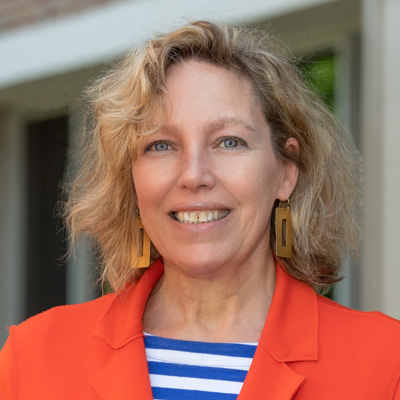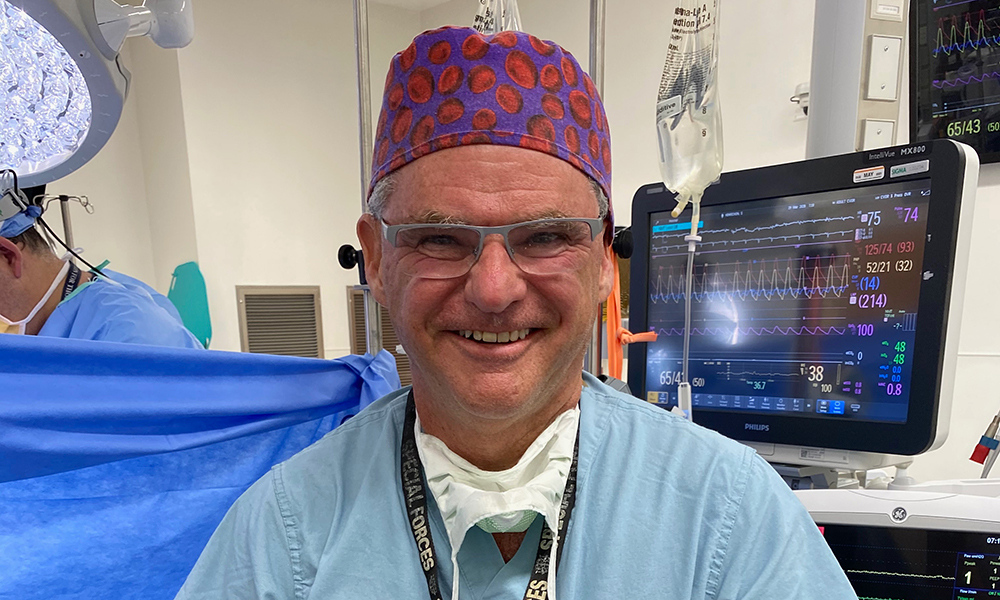For years Dr. Bruce Spiess ‘76 has been helping to save lives one by one as a specialist in open-heart anesthesiology. Today, he’s poised to save hundreds — even thousands.
Spiess, a professor of anesthesiology and associate chair of research at the University of Florida, is collaborating on three ideas that are helping to push back against the coronavirus pandemic and potentially help people across the planet.
In the midst of the COVID crisis, when supplies of personal protective equipment are at a dire low point, Spiess generated a way to manufacture N95 respirator masks from materials hospitals already have on hand. He tapped into a resource abundantly found at hospitals, Halyard 600 — the blue sterilization wrap used to protect surgical instruments from bacteria and germs. Masks made of this material can be fitted to the wearer and used up to four times if they are sterilized in between use.
Hundreds of these masks are in production now — and some Fortune 500 companies are looking at the design and determining if they can step in to ramp up production to the hundreds of thousands.
“It’s starting to catch on around the world,” says Spiess who majored in biology at Denison. “In less than a week I’m getting four-to-five thousand emails from places as far away as India, Australia, and Canada.”
“My hope is that we help save lives.”
While the Spiess masks aren’t meant to replace the N-95, they can be a crucial tool in the arsenal to contain the coronavirus. “Moment by moment this huge cottage industry is sweeping the world and helping first responders protect themselves. My hope is that we help save lives.”
Oxygen is Critical
A self-professed “nerd” and lifelong researcher, Spiess focuses his efforts on blood and its oxygen-carrying capacity critical to maintaining functions throughout the body. He specializes in something known as oxygen therapeutic pharmaceutical development — also known as “blood substitutes.” His expertise is in high demand, especially now when blood supplies are critically short and people can’t get out to donate.
For years, Spiess has been doing research with Hbo2 Theraputics, helping to perfect a blood substitute to safely deliver oxygen to the body. The company has developed and now manufactures a hemoglobin-based oxygen carrier, called Hemopure, a chemically stabilized extract from the red blood cells of cattle. Hemopure can be infused into the body, just like blood, and carries oxygen to the body, just as blood does.
Because it’s not yet approved by the FDA, Hemopure is only available for compassionate care use in a few patient populations, such as Jehovah’s Witnesses.
Spiess is working with Hbo2 to get FDA approval of the product, which could help alleviate a potentially life-threatening shortage of blood. “The U.S. military is excited about the possibilities of Hemopure - but they can only use FDA-approved products,” says Spiess.
And continuing that fascination with oxygen-carrying technologies, Spiess also studies perfluorocarbons (PFCs) — synthetic oils that dissolve oxygen up to 60 times more than human blood. Research has been done with animals and even humans to eliminate the need for breathing by replacing oxygen (air) with PFCs. (Think of that classic scene from The Abyss when the diver breathes in a helmet full of liquid) Spiess hopes to work with the FDA to see if this can help coronavirus patients with severe respiratory failure.
More than 1,500 humans have participated in these studies, which are registered with the FDA. Spiess has spoken to some of the participants. “There’s a moment of panic as your lungs are filled, and then you get past that. Your lungs and diaphragm stop moving and there’s no need to breathe.”

